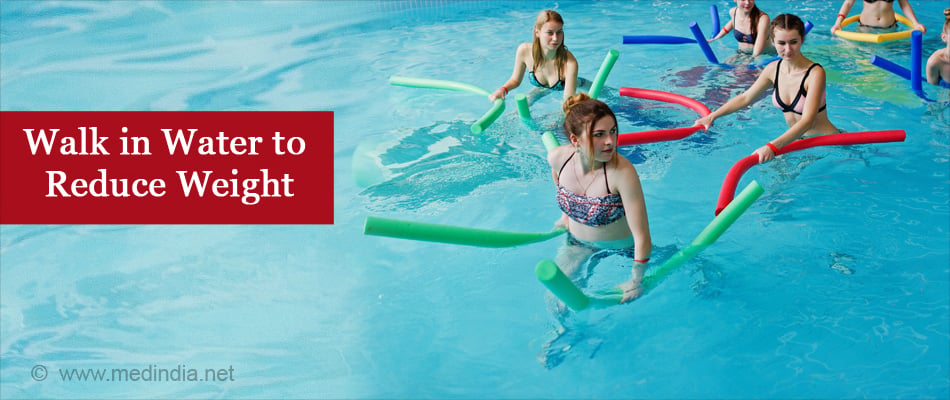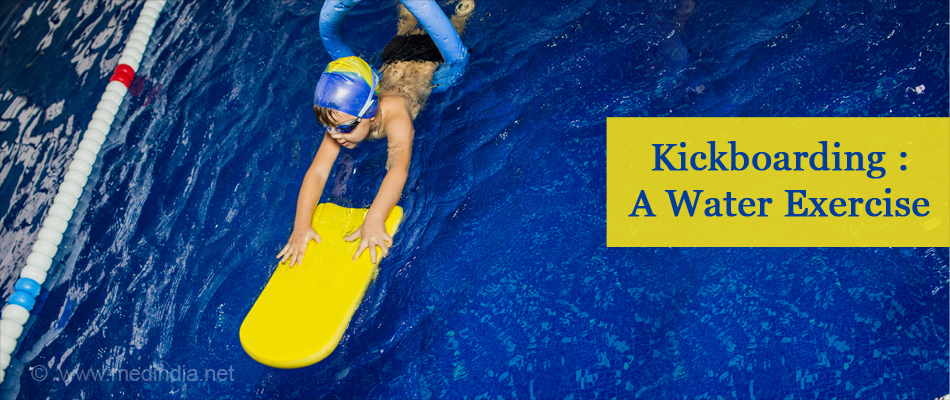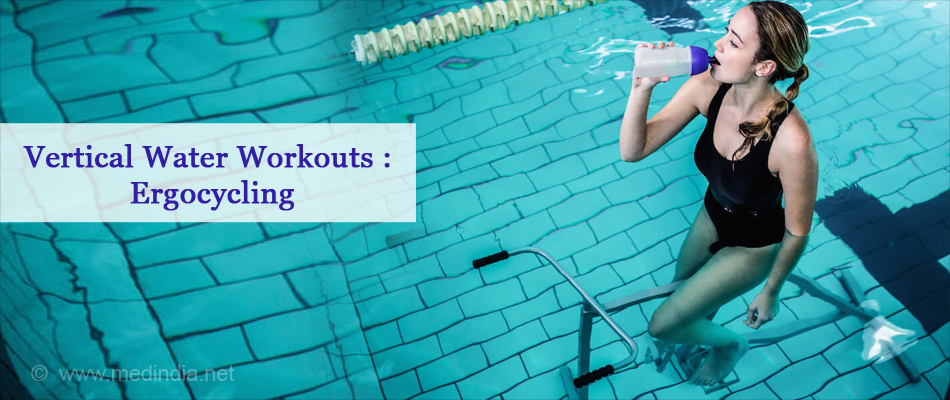- Lose Weight With Water Workouts - (http://www.healthywomen.org/content/article/lose-weight-water-workouts)
- Benefits and Techniques of Aquatic Therapy - (http://www.ventusers.org/net/10thconfbeneftsaquatic.pdf)
What is Water Aerobics?
Water aerobics is rapidly gaining popularity as a new type of fitness mantra. Water aerobics or aqua exercises are basically exercises that are performed in water. Water aerobics is best defined as a form of resistance training done in waist or neck deep water in aerobic style routines. It is performed mostly vertically and without swimming in waist deep water. It is one of the best ways to tone the body, achieve more stamina and lose weight.
These exercises are equally beneficial for those who are already extremely fit, as well as for those who lead a sedentary lifestyle, and plan to lose weight. It can also be performed by the aged, by pregnant women, and by people suffering from osteoarthritis and injuries to joints and muscles. For those who want to lose weight but are asked to refrain from jerky, weight bearing exercises on land, water aerobics is a great boon.
Not only that, water exercises are much more fun and one of the best ways to burn calories without the boredom of land aerobic routines. Apart from weight loss there is also a sense of well-being and improved fitness. The buoyancy of the water makes the exercises low impact, excellent for cardiovascular fitness, strength training and losing weight. Water aerobics is also a great stress reliever.
To gain faster results, more repetitions of each movement or increased speed during the workout is advised. Also, equipments such as webbed hand mitts, noodles, balls, barbells, bands may be used to increase muscle strength.
Maximum benefit from water aerobics can be attained through a combination of nutritious diet containing high protein, low fat and low carbohydrate, and adding water weights during the workout.
Research shows that people who practice water exercises can burn as much body fat and build as much muscle as those who engage in land-based exercise programs.
Nowadays, there is a wide range of specialized water aerobic exercises from water running, aqua cycling, to aqua yoga or aqua tai chi.
Water Exercises for Weight Loss
Recent scientific studies at the Texas Research Laboratory show that aquatic exercises have significant weight loss benefits.
Water walking: This includes walking in waist high water or deep water.
- In waist high water, walk from one side to the other side of the pool. Stand upright, with shoulders back and arms bent slightly. Slowly stride forward, placing the whole foot on the bottom of the pool with the heel coming down first. Increase speed in consecutive laps. Then try walking one lap facing forward and the next lap backward. This builds both abdominal and back muscles. For extra intensity, use water weights or swing arms while walking. Walk in water for 20 to 30 minutes at a time.
- For deep water walking, a flotation belt is used to keep oneself upright and floating at about shoulder height. Try walking backward and sideways to tone other sets of muscles. To add intensity to this workout, lift the knees higher. Alternate this with the faster pumping action of arms and legs for a brief period, followed by normal pace. Repeat the process 12-15 times.

Deep water running or aqua jogging: This is a super-intense water workout. You run in the deep end of a pool with the aid of a flotation belt or vest. Keep your body upright, shoulders back and use the feet to kick the water behind you. In this workout, the feet do not touch the bottom. Intensify the workout by swinging the arms higher, or faster, or by taking quicker strides. Around 17 calories are burnt per minute in this workout. One can also run in a zig zag pattern for a variation in exercise.
Resistance exercises: During this marching in place exercise, one starts from a standing position with legs together. Then bring left knee up at a 90 degree angle and release it back down. Then, repeat with the right leg.
Similarly, starting from the same standing position, bring the left leg out to the side and then back to center. Repeat with the right leg. This is a good aquatic exercise to lose weight from the thigh area.
Kickboarding: In this exercise, one places arms and upper torso on the kickboard. Then paddle around the pool using only the legs.

Upper body strengthening exercises: Straddle a pool noodle, a water resistance device, as if sitting on a horse. Pedal around the pool as fast as you can with the arms keeping the spine vertical. This will force the core muscles to keep you stable. Continue for 3-4 minutes.
Shoulder exercises:Raise your arms straight up out of the pool as high as you possibly can. Slowly lower arms back into the water and repeat. Complete one set of 10 repetitions.
Move arms away from the midpoint of the body. Slowly raise arms with palms down away from the body. Then raise them to shoulder level. Slowly lower arms and repeat. Complete one set of 10 repetitions.
Leg raise exercises: This exercise is performed while holding on to the side of a pool. Use left hand to hold on to the side of the pool. Keep knees slightly bent. Slowly swing right leg out to the side. Hold it there for a few seconds. Lower leg and repeat. Complete one set of 10 repetitions. Relax and repeat with the left leg. This exercise helps to strengthen the lower body muscles.
Vertical water workouts: This includes all exercises done in vertical position in the water such as water jogging, walking, water yoga, ergocycling, water treadmill and water tai- chi. During vertical water workouts the body experiences 75 percent greater resistance than when swimming horizontally. This is because the vertical position maximizes the drag or pull of water against body movements.

Core strengthening exercise with exercise ball: Hold the ball with both hands directly in front of the navel. Run across the pool as fast as you can for one minute. Rest for 30 seconds, and then repeat 3 more times, increasing speed each time. The ball can be held under arms alternately for variation.
Water treadmill: Due to viscosity, drag forces and frontal resistance, water provides a resistance which is proportional to the effort exerted against it when using the treadmill. Resistance in water ranges between 4 and 42 times greater than in air depending on the speed of movement.
Benefits of Water Aerobics
- Non weight bearing or low impact exercise. In water aerobics the water supports 90% of the body weight rather than the hips, legs and feet. Hence water aerobics is also referred to as a “non-weight bearing exercise”. Water creates a natural resistance, which allows pressure on the joints and muscles to be displaced by the water and the buoyancy reduces the impact on joints.
- Greater flexibility.When doing water aerobics, the joints can be moved easily and in a wide range of motion. As the body is subject to water resistance during water aerobic exercises, the joints naturally increase their range of motion.
- Helps weight loss. The combination of strength and cardio workouts mixed with water resistance in aquatic exercise ensures that the body is getting a full workout. The body can burn between 400 and 600 calories in an hour of water aerobics. For losing weight, it’s recommended that you perform a minimum of 150 minutes of aerobic exercise per week, at least 4 times per week.
- Increased muscle strength. Water provides 12-14 times the resistance of air, so even as one walks in the water, there is strengthening and building of muscle, and calories are burned faster.It is like having weights all around the body when moving about in the pool. Studies show that after 12 weeks of regular aquatic aerobic exercise there are significant gains in strength, flexibility and agility.
- Improved cardiac conditioning. As one increases the size and speed of movements, the heart rate, though increased, will be roughly 10 to 20 percent lower than when exercising on land. In fact, the water pressure enables the blood flow to circulate more effectively throughout the body putting less stress on the heart.
- Reduces pressure on the joints. Water aerobic exercises relieve pressure on joints from normal wear and tear and arthritis. In fact, hydrotherapy is shown to be the leading form of therapy for those suffering from joint problems.
- Toning of both the upper and lower torso. When doing aerobic exercises in the gym, a lot of the focus is on muscles in the lower half of the body, whereas in water aerobics, both the upper torso along with the lower torso are toned, as in swimming.
- Soothing massage of the body with light hydrostatic pressure provided by the water.
- Helps de-stress and reduces anxiety. Looking at or being in water is one of the most soothing activities. Studies indicate that aquatic exercises significantly brought down anxiety and stress levels.
- Cooling exercise. As temperatures get hotter, dipping into water, becomes alluring. Water aerobics satisfy the craving for coolness in warmer temperatures, while still enabling people to exercise.
- Popular fun activity. Water aerobics appeals to all age groups and does not require any special skills. As a result, it is one of the most popular bonding activities for friends and family.

Some Important Tips:
- Include some dry land exercises to increase mineral bone density.
- For optimum results exercise minimum 4 days a week, provided the exercise duration is not less than 45 min.
- Drink plenty of fluid to avoid dehydration
- Before using resistance devices such as webbed hand mitts, noodles, balls, barbells, or bands, make sure you are balancing arms and legs to help coordinate and stabilize body movements.
- Some people experience allergic reactions to pool chemicals, and might need to use earplugs. Showering thoroughly after a workout with chlorine cleansing soap and applying moisturizer afterward helps avoid dry and itchy skin.
- Wear water shoes to improve traction and prevent foot injury.










